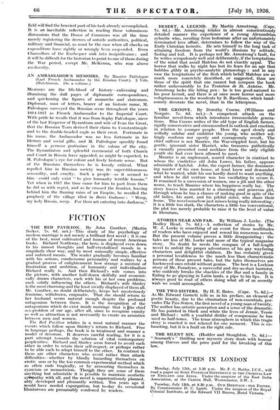THE GROOVE. By Dorothy Cosens. (Williams and Norgate. 7s. 6d.
net.)—A competent attack on the familiar novel-form which introduces irreconcilable genera- tions. Miss Cosens writes of the old type of English farmer, rigidly conservative and circumscribed in outlook and emotion, in relation to younger people. Here the aged slowly and wilfully subdue and embitter the young, who neither wil- lingly conform nor openly and courageously. revolt. The chief sufferer is not Maurice, the War-crippled hero, but his gentle, ignorant sister Harriet, who treasures pathetically a casually presented coral necklace from the only -eligible youth she had ever been allowed to meet.
Maurice is an unpleasant, soured character in eimiiist to whom the vindictive old John Lawes, his father, appears admirable if hateful. John, the expert farmer, the domineer- ing master of his own house, at least knew and demanded what he wanted, while his son hardly dafed to want anything, and when he did venture was too vacillating to secure it. It remained to a succession of women, one a jilt and the other worse, to teach Maurice where his happiness really lay. The story leaves him married to a charming and generous girl, through whom he has a chance of making good in spite of the old ladies, his aunt, and his pitiful sister, who share their home. The novel somehow just misses being really interesting ; it is a little too stark, the characters a little too conventional, the plot too merely probable to raise it to the level of value in literature.










































 Previous page
Previous page